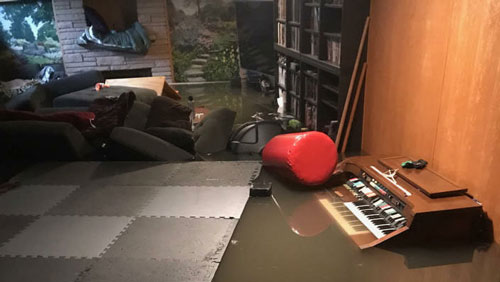Ben Adler
American writer and game designer Colin McComb might seem an unlikely climate change refugee.
The middle-aged video game developer is a middle-class Midwesterner, not an impoverished resident of a small island nation threatened by sea-level rise.
But the resident of Grosse Pointe Park, Mich., an affluent, inner-ring suburb of Detroit where he lives with his wife and two kids, says global warming is destroying his family’s quality of life.
In 2016, heavy rains caused their basement to fill with 36 inches of water. “We thought it was a one-and-done, so we refurnished the basement,” he recalled.
After all, they had been living in southeast Michigan for years, and the massive rainfall that caused the flood wasn’t a regular occurrence — or, at least, not yet.
The basement in Colin McComb's home in Grosse Pointe Park, Mich., as he first looked down the stairs after it flooded on June 26. (Colin Moulder-McComb)
Colin McComb’s first look down the stairs to his basement in Grosse Pointe Park, Mich., after it flooded on June 26. (Colin Moulder-McComb)
He was wrong. This June, McComb got 42 inches of water in his basement after the sewer backed up again, under pressure from more than 6 inches of rain.
And then it flooded again, around 8 inches, in July. “My wife had her old band memorabilia down there; we had financial records down there,” McComb recalled. “Basically everything got trashed. We are estimating around $40,000 of damage.”
When New York City basements flooded, to deadly effect, from Hurricane Ida earlier this month, the news made national headlines.
But the underlying causes in the Big Apple — increasingly heavy rains, aging public and private infrastructure and a combined sewer and stormwater system — are just as prevalent, if not more so, in many poorer parts of the Northeast and Midwest.
It’s not just the financial or sentimental value of what’s lost, but the unpleasant hassle of dealing with the damage that has McComb’s family considering giving up on their home.
Pulling out soaked couches, books, electronics and children’s toys, drilling holes to prevent mold and bleaching and sanitizing what was left has forced McComb to take two weeks off work.
Worst of all is the reason the basement flooded in the first place: The local sewer system backed up. “The second flood was actually the worst, because I actually found human feces in my basement,” said McComb.—Agencies










